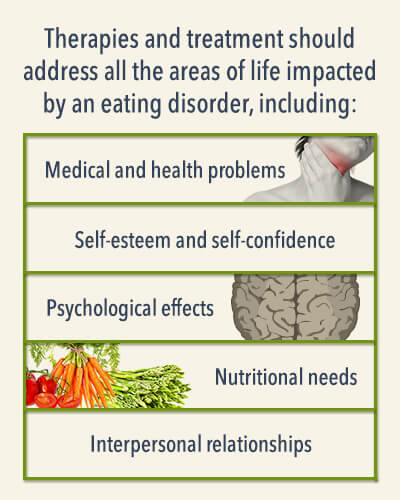The National Association of Anorexia Nervosa and Associated Disorders (ANAD) says that 28.8 million Americans will suffer from an eating disorder during their lifetime. And this represents nearly 9% of the national population.
Eating disorders, including anorexia nervosa, bulimia nervosa, and binge eating disorders, present complex challenges that impact both the body and mind.
Understanding the latest approaches to treating these conditions allows you to refine your interventions and improve client outcomes. In this A-Z guide, we’ll dive into groundbreaking approaches to eating disorder therapies.
Understanding the Complexity of Eating Disorders

Eating disorders are more than just food issues. They’re serious mental health conditions that stem from a combination of genetic, biological, psychological, and sociocultural factors. The consequences of eating disorders can be severe, affecting physical health, emotional well-being, and overall quality of life.
Traditional treatments have included a blend of medical intervention, nutritional counseling, and psychotherapy. However, innovative approaches are expanding the toolkit for practitioners, offering new hope for those struggling with these disorders.
The Role of Technology in Treatment
One of the most exciting advancements in eating disorder treatment is the integration of technology. For example, telehealth has become an invaluable resource, particularly during the COVID-19 pandemic. It allows you to reach clients without access to specialized care in their geographic area. This remote approach can also reduce the stigma associated with seeking treatment, as patients can engage in therapy in the privacy of their homes.
Also, you can use specific apps and online programs to support eating disorder recovery. These tools can provide meal planning assistance, mindfulness exercises, and daily logs to track progress. They can also offer immediate access to coping strategies and educational resources, making support more accessible and continuous.
Integrating Mindfulness and Meditation
Mindfulness and meditation have long been recognized for their benefits in managing stress and improving mental health. In the context of eating disorders, these practices can help clients develop a healthier relationship with food and their bodies.
For instance, Mindfulness-Based Eating Awareness Training (MB-EAT) combines mindfulness meditation with guided eating practices to help individuals recognize their body’s hunger and satiety cues. This method encourages a non-judgmental awareness of eating habits and promotes a more intuitive way of eating.
You can also integrate mindfulness into cognitive-behavioral therapy (CBT), which is a cornerstone of eating disorder treatment. As a result, you can help clients stay present and focused during the session. This enhances their ability to challenge and change negative thought patterns related to body image and food.
The Promise of Nutritional Psychiatry
Nutritional psychiatry is an emerging field that examines the impact of diet on mental health. Research has shown that certain nutrients can influence brain function and mood regulation, which is relevant for eating disorder treatment. Therapists can collaborate with dietitians in nutritional psychiatry to create comprehensive treatment plans to address both psychological and nutritional needs.
For example, omega-3 fatty acids, found in fish and flaxseeds, have been linked to improved mood and cognitive function. Probiotics, which support gut health, are also being studied for their potential role in mental health. You can offer a more holistic approach to treatment by integrating nutritional guidance with psychotherapy,
Family-Based Treatment and Support Systems
Family-based treatment (FBT) has been effective for adolescents with eating disorders. It involves the entire family in the treatment process, recognizing that the family system plays a crucial role in the recovery journey. FBT empowers parents to take an active role in their child’s nutrition and encourages open communication within the family.
Innovative approaches also recognize the importance of peer support. In-person and online support groups provide a sense of community and shared experience that can be incredibly valuable for individuals in recovery. They offer a space for clients to share their struggles and successes, reducing feelings of isolation and promoting a sense of belonging.
The Power of Art and Expressive Therapies
Art therapy and other expressive therapies, such as dance and music therapy, offer alternative ways for clients to express emotions and experiences that may be difficult to articulate verbally. They help people with eating disorders, as they often struggle with verbalizing their feelings and may have a disrupted sense of self.
Art therapy lets clients explore their body image and self-perception in a non-threatening way. Creating art can serve as a metaphor for the therapeutic process, helping clients visualize their progress and confront their fears. Similarly, dance and movement therapy can help individuals reconnect with their bodies in a positive and empowering manner.
Advancing Your Continuing Education in Eating Disorders
Want to make strides in eating disorder treatment? Online CE Credits provides high-quality online CEUs for counselors, therapists, social workers, and psychologists. Access on-demand CE courses and completion certificates 24/7 from the convenience of your home! Take a look at the programs below:
- Honest Lies – Diagnosing Eating Disorders for Mental Health Professionals
- Narrative and MI Approaches to Eating Disorders
- Alexithymia and Eating Disorders
Also, discover more insightful tips on ADHD training to elevate your practice.

Addressing Trauma and Co-occurring Disorders
Many individuals with eating disorders have a history of trauma or co-occurring mental health conditions, such as anxiety, depression, or obsessive-compulsive disorder (OCD).
Innovative treatment approaches recognize the need to address these underlying issues to support lasting recovery.
Trauma-informed care also emphasizes safety, trustworthiness, and empowerment and creates a therapeutic environment where clients feel secure and understood.
Eye Movement Desensitization and Reprocessing (EMDR) is an evidence-based therapy that has shown promise in treating trauma and associated symptoms. It can help clients with eating disorders find relief from distressing thoughts and behaviors since it processes traumatic memories to reduce their emotional impact
The Importance of Cultural Competence
Eating disorders affect individuals from diverse backgrounds, and cultural factors can influence the presentation and treatment of these conditions. Cultural competence in therapy involves understanding and respecting the cultural contexts of clients’ lives. This includes being aware of cultural attitudes toward body image, food, and mental health.
You can brush up on your cultural competence by seeking training and education on working with diverse populations. A culturally sensitive therapeutic environment enables you to build stronger connections with your clients and provide more effective, individualized care.
The Future of Eating Disorder Treatment
The field of eating disorder treatment is changing, with new research and innovations paving the way for more effective interventions. As a therapist, stay informed about these developments to provide the highest quality care. For example, you can attend professional development workshops, participate in continuing education courses, and engage with the latest research.
Incorporating these innovative approaches into your practice improves your effectiveness as a therapist and offers hope and healing to those struggling with eating disorders.
Head On Over to Online CE Credits
Earning your CE credits doesn’t have to be hard. We offer asynchronous lessons on flexible payment options. You can either choose to pay once or take on a membership plan. And the good news is that if you’re unhappy with your program, you can claim a refund. Overcome CE challenges with our flexible and convenient options.